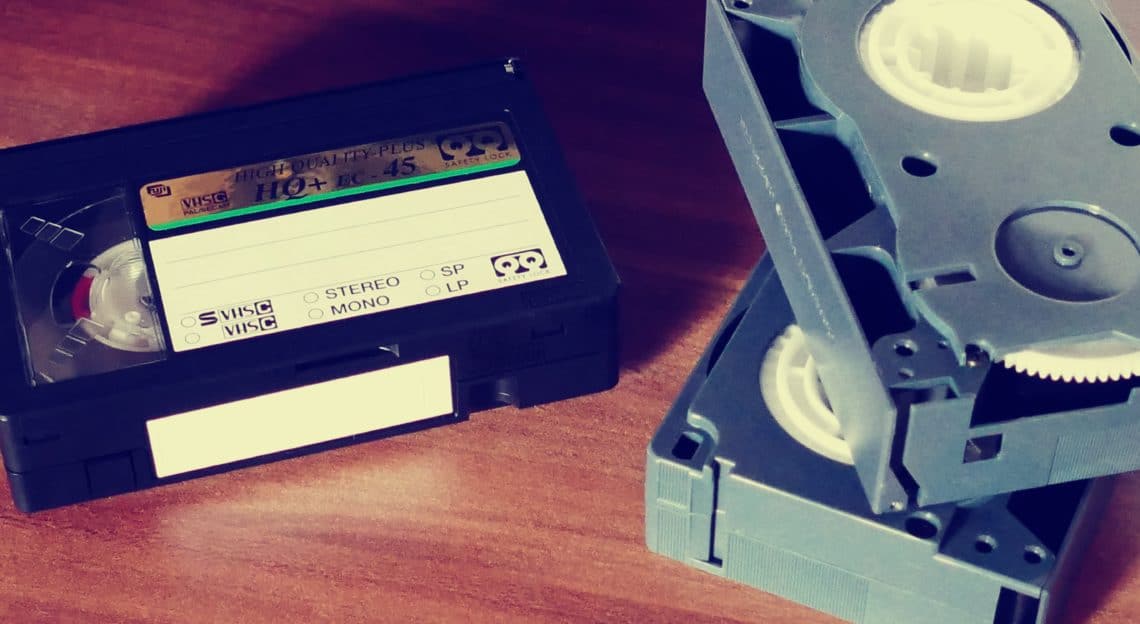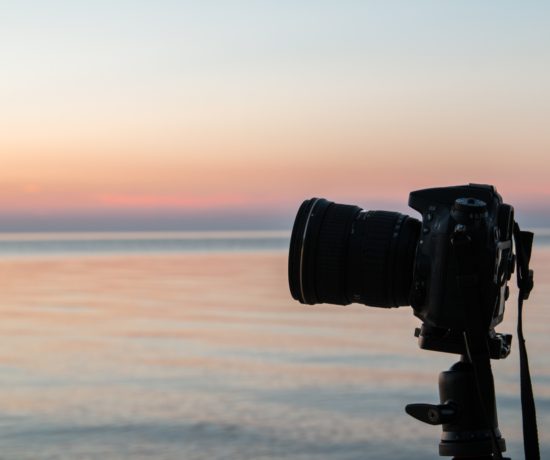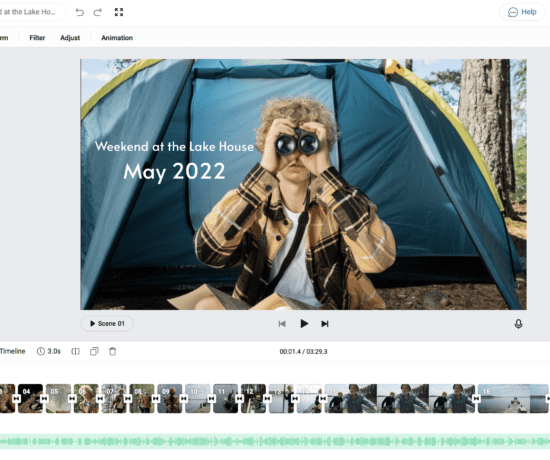If you’re like most people, you have stashes of old prints, film reels, VHS tapes, and audio cassettes in a box somewhere. Maybe they’re just forgotten…. 0r maybe they’re in there because digital came along and made everything easier. What to do with them all? Well, as a family history advocate, I want you to get it all digitized. If I could have it my way, I’d want you to get the originals organized and stored in archival boxes too. But I know that’s not always an option. I often get asked how to recycle the old stuff, and because the answer is not an easy one, I have put some options together in this post. After all, if you’re going to get organized, you’re gonna need to declutter and/or make useful what you already have. Here’s are a few suggestions on what to do with all that outdated media…
To Scan or Not to Scan?
That is the question. And only you can answer it. What are you going to do with all those film reels, VHS-tapes, slides, and faded polaroids? As a Genealogist with a perfectionist streak, my instinct is always to tell people to hold on to their family history originals. Not necessarily all of it, but at the very least, the best memories. You don’t have to scan everything, but you do have to scan some. It’s not just for your own benefit, but for that of your future descendants.
So what items tell your story? I tend to favor dynamic content first, which often means video, i.e your home movies. That’s because video is “live” and it shows you personalities, mannerisms, and other traits that sometimes get lost elsewhere. Second are photos, but they’re not far behind. Third is other memorabilia, and only because it’s auxiliary. That’s my list. You get to make your own, so sit down and figure out what’s important to you. That’s when you’ll know what to toss and what to keep.
Saving Your Original Media
If you have decided to digitize your old media, you may be wondering why saving the originals is important? The answer is simple. The original is always the best quality available. Everything else is derivative. As I explained in this post, technology continues to improve, and if you ever decide to get something re-scanned at a new higher resolution, you will want to work from the original. Film reels are the best example of this. They are usually of very high quality even though they may be old, and they may be of great interest to someone in the future. They’re worth saving.
If you have a large collection that you wish to preserve and you don’t have space at home, you can rent space in a salt mine. Yep, you read that right. This is not as weird as it sounds. Underground storage is ideal in terms of temperature, humidity, and security, and it’s a standard practice that has existed in the entertainment industry for decades. You can give your memories the royal treatment as well! Why not? A good example of a quality storage company in the U.S. is Underground Vaults & Storage. They have locations in Kansas, Missouri, and Kentucky, and they are members of AMIA (the Association of Moving Image Archivists), which is something you film buffs out there will appreciate.
Digitizing Your Original Media
Unless you or someone in your family worked in the entertainment industry, your home movies are most likely private recordings. Private recordings usually equal family memories, so I would highly recommend getting them digitized, so that you can enjoy them without pulling out an old projector. They should be organized, digitized, properly labeled, and stored in an archival-safe system. I would also recommend that you cross-reference them with their digital versions (if you decide to keep them).
VHS-tapes and audio cassettes were created by the entertainment industry mainly as a distribution system (to reach millions of customers on the cheap), so they are highly vulnerable to damage and decay. They were never really meant to be permanent “storage,” so you’re best off getting tapes like that digitized as soon as possible. In contrast, film reels are generally of much better quality, and with proper storage, they can last for many decades. It may feel counterintuitive to start with the newer tapes, but they were just made poorly from the beginning. I usually tell people to start with the 1980s-1990s in mind, and work their way backwards. If you need help with this, you’ll want to find a good provider who understands the ins and outs of media conversion. More on that in a minute.
Selling Your Media
If you have footage or prints that you don’t need anymore, consider selling it as stock media. This assumes that your recordings are of interest to the world, of course. Examples might include travel footage, images of famous landmarks, clips of sporting events, and so on. Most of you won’t have this type of stock in your collections, but if you do, you can make some extra money licensing your content. There are a gazillion places online where you can sell stock media, but the two best ones (in my opinion) are Pond5 and Shutterstock.
What to Do with Commercial Recordings
If you have commercial media (meaning they were once sold in a store), selling isn’t recommended. Why? Because in 99.9% of cases, you are not a distributor and don’t own the copyright to the recordings. However, there are a few companies that seem to have figured out how to get around copyright laws. I don’t have enough space on this page to venture into a discussion on how they do that, but just know that there are places you can go if you want to make a buck or two. One of those places is Half Price Books, which has many locations throughout the U.S. If there’s no store close to your location, you can visit Murfie.com to have your CDs and Vinyls digitized (and streamed). I’m am their affiliate, so feel free to use the coupon code SWEDISH1 for 10% off your service. It’s an easy way to get rid of your CDs and make some money at the same time.
If you have other commercially-produced media, such as VHS tapes, don’t bother digitizing them. Reason #1 is copyright, and reason #2 is that it’s far cheaper to get a new version of the recording in a better format. It’s a good idea though to check auction sites like Ebay to see if your recording holds any value. Some commercial recordings are very valuable in older formats. The writers over at Mental Floss recently put together a very interesting article showcasing a few examples of what to look for – vintage Disney, anyone? You might be sitting on a fortune!
Donating Your Originals
If you must get rid of your originals, and you can’t (or don’t want to) sell them, consider donating them before you look into recycling options. It will be a cheap option for you, and you’ll feel better knowing that your media is put to good use. If you have extended family, they might want the recordings. I know I get happy if I get my hands on a treasure! If not, check with the non-profits in your local community if there is someone willing to take them off your hands!
You may think that private recordings aren’t appropriate as donations, but many times your local museum or historical society may have interest in them. These organizations preserve our joint cultural heritage, and they are usually very happy to receive donations, especially those which show local history. Perhaps your home movie is of a parade in your hometown – if so, the town historian will love that footage! Perhaps your old photos show buildings that are no longer in existence – if so, those photos can be a very significant resource for your local historical society!
If you have commercial recordings, for example movies on VHS, the answer is an easier one. You can usually donate them to Goodwill, Savers, or the Salvation Army. You can also try to find a new home for them through Freecycle. Why not let someone else use them, and get a tax deduction in return? It’s a win-win!

I’m a Perfect Pinnable!
Recycling Your Media
If you have decided to recycle your media once it’s all been digitized, your first option should be to locate a responsible recycler nearby. Easier said that done, but worth a shot! Use a checklist to count exactly how much you have of everything – this will be good to know if you have to use a mail-in services that charges by the pound or by item. Unfortunately, I don’t know of any nationwide recycling stations that accept everything, so you may have to divide and conquer depending on where you live.
Here are a few resources:
This service make it easy and free to recycle all of your old CDs, DVDs, Blu-Rays and storage cases. You will have to pay for shipping to their NH facility, but I think that is a small price to pay to keep toxins out of landfills, don’t you?
This mail-in service accepts a long list of items, including e-waste.
This is a wonderful resource for all of your e-waste (they call it techno-trash), including all your film reels. They charge a small amount, but accept a lot of different things, so you can mail a big box of mixed media if you want. You can see a full list of what they accept here.
- Project Get Reel
If you are in Canada, check out this project, which accepts many different media formats.
Erasing Your Media (If You Are Recycling)
If you have decided to recycle your old media, you might consider erasing the data first. Do you have to do this? No, you don’t (unless you’re a politician), but you’ll sleep better at night knowing that your privacy will be protected.
To erase a hard drive, KillDisk is a popular program that you can download and use. DP Wipe is another one. To erase media from external hard drives, memory cards, floppy discs, or on drive partitions, you can also try MediaWiper. It’s a little easier with analog media. To erase footage from a VHS, U-matic, or Beta tapes, you can simply record over the footage you want to hide, if you still have a functioning recorder/player. If you’d like to be a bit more efficient, you can use a Degausser (a bulk eraser). This type of system sends a electromagnetic field over the tape, thus erasing the recording. Try the V94 Digi TapeMaster Degausser from VS Security Products. B&H Photo has higher end Degaussers available here. A more budget-friendly option is the PF 211 model shown here.
Got E-Waste?
In addition to your old film reels and tapes, you probably also have some e-waste in that old box. Cassette players, VHS players, and other electronics need to be recycled responsibly because in many places, it is illegal to dispose of e-waste in the trash.
Jump drives, memory cards, floppy discs etc can all be recycled, so they are accepted in many places. VHS tapes and cassettes are trickier to recycle because they are made up of two different types of materials. The outer shell is usually made of polystyrene, which is recyclable, but the magnetic tape inside is made up of polyethylene terephthalate (PET), sometimes referred to as “Mylar,” that cannot be recycled. To make matters worse, the tape is coated with toxic metals (which is what allows it to be magnetic and recordable), and is therefore classified as e-waste. In short, tapes and cassettes should not end up in landfills for obvious reasons. You can learn more about e-waste and their toxins here!
Finding a Local Drop-Off Recycler
If you have an old player of some sort, your first step should be to check which manufacturer made your product. Some of the larger manufacturer’s have TakeBack Programs in place, though unfortunately not all. The Electronics Takeback Coalition has a list of manufacturer programs available here. If you find that your manufacturer has a program, just follow their instructions on how and where to drop it off.
If you cannot find any information from the manufacturer, try finding an e-waste station through E-Stewards. Plug in your address or zip code on this website, and they will show you where you can find a local option. Your local Best Buy or Staples will usually accept limited amounts of e-waste too. Another idea would be to check with your local community leadership (country or city) if they offer an e-waste recycling service. Some countries host events throughout the year for their residents, but you have to keep your eyes open for the notices. A quick phone call to your village hall will usually clear it all up.
Recycle by Mail
If you can’t find a local recycler, there may be one in another area that accepts e-trash by mail.
Here are a few resources to check:
- World Computer Exchange (donate a computer or computer accessories).
- TerraCycle (This mail-in recycler offer lots of recycling options, so you may get lucky)
- All Green Recycling (This California-based company has over 100 drop-off locations throughout the USA, so there may be one near you).
- Back Thru The Future Technology Disposal (If you are in New England, this may be a good option for you. The “elsewhere located” will pay shipping to their facility. This company is certified environmental recycler).
If you do decide to use a mail-in service, be cautious of where you send your items. Some recyclers export the electronics and dump them into developing countries with no or significantly smaller recycling programs. That doesn’t help the environment at all, so please ask the service you choose what they do with the items, and where they ultimately end up. Opt for a certified recycler if you have a choice.
Upcycling Your Media
If you are a crafty person, you may not need to recycle at all! Take a look at my Pinterest board of ideas on how to repurpose some of your outdated media! For more great recycling ideas and DIY projects, check out Earth911.com and Recycle Nation. Perhaps you can have some fun with your old media instead or trashing it? As long as it’s not moldy or otherwise hazardous, you can put it to good use.
Finding a Quality Photo Organizer or Media Digitization Service
If you need help with your project, consider hiring a local specialist who can provide you with personal attention. There are many online services and big box retailers out there who offer scanning services, but they are not always the best choice. Many of them offer so many different services that they don’t specialize in any given format. Some of the low-cost providers outsource to vendors (often overseas) who use budget equipment to keep costs down. Do you really want to ship your irreplaceable memories back and forth across the world with no real understanding of where it is, who is handling it, and what type of equipment they’re using? I feel that the less shipping you need to do, the better, and if a trained pro will handle your memories for you, that’s worth the extra cost.
Search the Online Pro Directories
Your best bet for finding a local pro is the Association of Personal Photo Organizers, more affectionately known as APPO. This association has members around the globe, and many of them are trained in handling different formats. As a member myself, I can vouch for the professionalism of my colleagues, and I highly recommend that this be your go-to resource for local help. In the search function on their website, you can search for different types of professionals depending on your needs.
If you find any damaged film in your collection, I can highly recommend my colleague Rhonda Vigeant of Pro8MM in Burbank, California. Pro8MM does a fantastic job on all types of film reels, including those reels containing audio, and more obscure film formats.
What to Ask Your New Provider
It’s important that you understand what will happen to your memories once they leave your hands, so don’t be shy about asking questions. A good provider will be happy to explain everything to you!
Here are some questions to put on your list:
- What type of training does the person handling my memories have?
- What type of system to they have in place to ensure that my memories aren’t lost or damaged?
- Do they have insurance?
- What is the process like?
- Do you offer pickup or delivery?
- What type of equipment will be used?
I cannot stress enough how important it is to find the right professional to help you with your memories. You want to find the right person, get to know that person, trust that person, and have clear channel of communication for each step of your project.
Ready to Get Started?
Before you can make a decision on what to do with your collection, you need to know exactly what you have. Look at your collection. Do you know what everything is? Do you have film reels? VHS tapes? Audio cassettes? What is it exactly? And how many of them you have? Is is commercial media, or private recordings? If you don’t know the answer to this question, book a Virtual Organizing session with me, and I will help sort if out for you!






Jana Last
April 15, 2017 at 8:26 amCaroline,
I want to let you know that your blog post is listed in this week’s Fab Finds post at http://janasgenealogyandfamilyhistory.blogspot.com/2017/04/follow-friday-fab-finds-for-april-14.html
Have a great weekend!